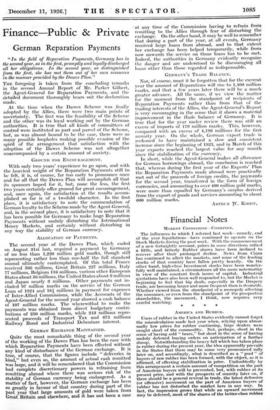Finance—Public & Private
German Reparation Payments
"In the field of Reparation Payments, Germany has in the second year, as in the first, promptly and loyally discharged all her obligations. In the second year, as distinguished from the first, she has met them out of her own resources in the manner provided by the Dawes Plan."
THE foregoing is taken from the concluding remarks in the second Annual Report of Mr. Parker Gilbert, the Agent-General for Reparation Payments, and the detailed document thoroughly bears out the declaration made.
At the time when the Dawes Scheme was finally adopted by the Allies, there were two main points of uncertainty. The first was the feasibility of the Scheme and the other was its loyal working, out by the German authorities. It is true that all kinds of committees of control were instituted as part and parcel of the Scheme, but, as was almost bound to be the case, there were so many possible loopholes making possible evasion of the spirit of the arrangement that satisfaction with the adoption of the Dawes Scheme was not altogether unaccompanied by a certain amount of anxiety.
GROUND FOR ENCOURAGEMENT.
With only two years' experience to go upon, and with the heaviest weight of the Reparation Payments still to be felt, it is, of course, far too early to pronounce once and for all that the Dawes Plan will accomplish all that its sponsors hoped for it, but, none the less, the first two years certainly offer ground for great encouragement, and, once again, the satisfaction at the results accom- plished so far is of a twofold character. In the first place, it is satisfactory to note the commendation of German loyalty to the Scheme made by the Agent-General, and, in the second place, it is satisfactory to note that it has been possible for Germany to make huge Reparation Payments without unduly disturbing the International Money Markets, and certainly without disturbing in any way the stability of German currency.
ALLOCATION OF PAYMENTS.
The second year of the Dawes Plan, which ended on August 31st last, required a payment by Germany of no less than 1,220 million gold marks, though still representing rather less than one-half the full standard annual ultimately contemplated. Of this total France received 566 millions, Great Britain 227 millions, Italy 77 millions, Belgium 116 millions, various other European States about 56 millions, the United States about 9 millions and Japan nearly 3 millions. Other payments out in- cluded 97 million marks on the service of the German Loan of 1924 and 181 millions in payment for expenses of Inter-Allied Commissions, while the Accounts of the Agent-General for the second year showed a cash balance of 107 million marks. The wherewithal to make the payments was obtained from direct budgetary contri- butions of 250 million marks, while 243 millions repre- sented proceeds of Transport Tax and 675 millions Railway Bond and Industrial Debenture interest.
GERMAN EXCHANGE MAINTAINED.
Quite the most remarkable thing of the second year of the working of the Dawes Plan has been the ease with which Reparation Payments have been effected without any kind of disturbance of the German exchange. It is true, of course, that the figures include " deliveries in kind," but even so, the amount of actual cash remitted was large, and it will be remembered that the Commission had complete discretionary powers in refraining from remitting abroad where there was serious risk of the stability of German currency being endangered. As a matter of fact, however, the German exchange has been so greatly in favour of that country during part of the past year that large amounts of gold were taken from Great Britain and elsewhere, and it has not been a case at any time of the Commission having to refrain froM remitting to the Allies through fear of disturbing the exchange. On the other hand, it may be well to remember that during a part of the year, at all events, Germany • received large loans from abroad, and to that extent her exchange has been helped temporarily, while from now onwards the service on those loans has to be met. Indeed, the authorities in Germany evidently recognize the danger and are understood to be discouraging all loans other than those regarded as indispensable.
GERMANY'S TRADE BALANCE.
Nor, of course, must it be forgotten that for the current year the amount of Reparations will rise to 1,500 million marks, and that a few years later there will be a much greater advance. All the same, if we view the matter for the moment from the standpoint of recipients of Reparation Payments rather than from that of the trading interests of the Allies, the Agent-General's Report is very encouraging in the sense that it shows a material . improvement in the tirade balance of Germany. It' is true that for the year under review there was still an excess of imports of 179 million marks. This; however, compared with an excess of 4,196 millions. for the first annuity year. On the whole, German export trade is reckoned to have maintained a slow and consistent increase since the beginning of 1925, and in March of this . year exports reached the largest value for any month since the stabilization of the currency.
In short, while the Agent-General makes all allowance for German borrowings abroad, the conclusion is reached that, whereas during the first year of the Experts' Plan the Reparation Payments made abroad were practically met out of the proceeds of foreign credits, the payments for the second year, transferred in the form of foreign currencies, and amounting to over 400 million gold marks, were more than equalled by Germany's surplus derived from the export of goods and services amounting to about 600 million marks.
ARTHUR W. KIDDY.














































 Previous page
Previous page